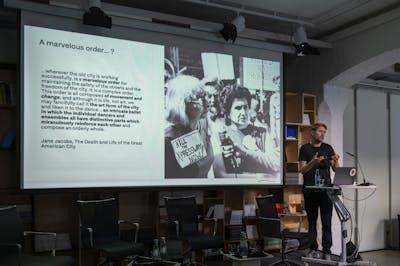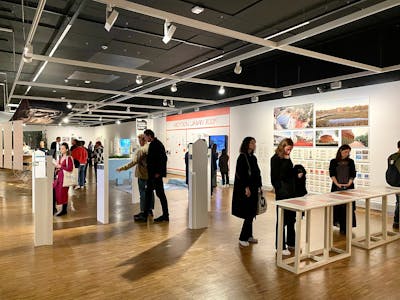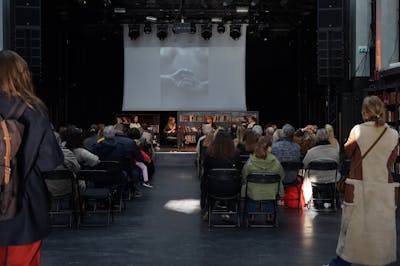Curatorial statement
This year's Triennale spotlights neighbourhood as a place and horizon for rethinking our cities.

Former industrial site Vulkan, in the later years changed into a vital part of the city combining both housing, culture and business. Photo: Nicki Twang/Aspelin Ramm.
With the working title Mission Neighbourhood – (Re)forming communities, the Triennale will explore how we form the places we share.
In a time when the world is facing major social and environmental challenges, Oslo Architecture Triennale 2022 spotlights neighbourhood as a place and horizon for rethinking our cities. With the working title Mission Neighbourhood – (Re)forming communities as the overarching theme, the Triennale will explore how we form and might reform the places we share.
What do we mean by “neighbourhood”? Neighbourhoods represent the sum of everyday places we share with one another: The streets, squares, bus stops, kindergartens and schools, the places where we shop and go out – if possibilities allow. The neighbourhood is where communal activities take place. But it is also the context where the structures of society at large are expressed. The neighbourhood scale reveals our ability as a collective to handle challenges and create meaningful frameworks for everyday life.

Triennale Director Christian Pagh in conversation on urbanist and journalist Jane Jacobs, who in the 60s and 70s pioneered many of the concepts about the good neighbourhood that we highly value today. Photo: Erik-Jan Ouwerkerk
During the next 18 months, the Triennale will be an open laboratory for our joint investigation of ways to form the neighbourhoods of the future: Which features distinguish good neighbourhoods? How can infrastructure such as roads be transformed into neighbourhood spaces? How can places like schools, offices and shops be accessible for more diverse users and uses?
And we will take a closer look at ways to reform the systemic and political premises of neighbourhood development: How do we grasp the value of good neighbourhoods – for the individual, for the public health and for sustainable societal development? How can politicians and the public administration create better conditions for fostering neighbourhood quality? How can capital play a different, positive role in urban development on a neighbourhood scale? Can new residential projects contribute to social and environmental sustainability by sharing more with the community? The open laboratory is a local, national and international platform where citizens and professionals can meet the common challenge: how to create more living, fair and inspiring neighbourhoods.
"How do we grasp the value of good neighbourhoods – for the individual, for the public health and for sustainable societal development?"
Christian Pagh, Chief Curator and Director
The Triennale will bring forward the skill and ambition, existing both within and outside of professional circles, to contribute to a fairer, more empathic take on city development. It will showcase practices, people and projects that contribute to neighbourhood thinking – from the local transformation of a single street to large-scale visionary city planning. We will shed light on neighbourhood’s past, present and future to show the wide array of possible diverse, vibrant communities.
The theme builds upon a surging global interest in developing local environment, such as the Parisian 15-minute City and Barcelona’s Superblocks. With the current reset of work-life boundaries, due to the covid-19-pandemic, it has become increasingly urgent to investigate the neighbourhood’s potential. The goal is to bring this investigation further, adding insight, ideas and proposals for action.
Mission Neighbourhood is an invitation to heighten the collective imagination regarding the spaces of everyday life. As with any mission, there is a goal: To visibly boost critical and constructive inquiry into the possibilities of neighbourhood within and across different disciplines. We seek responses and responsibilities: What must be done? Who can do it? What is our responsibility? And last, not least: What can we accomplish together?


